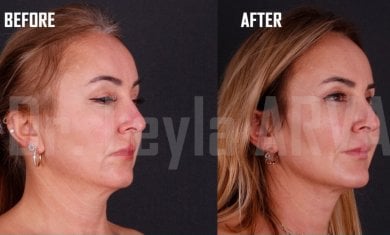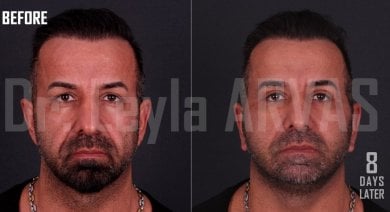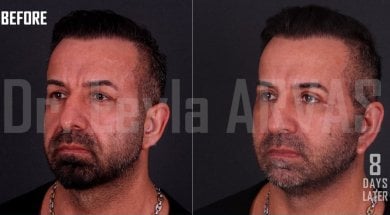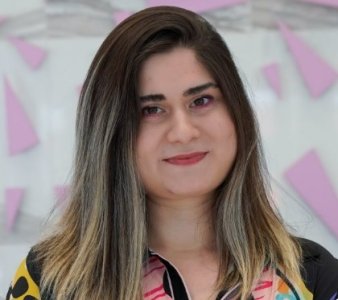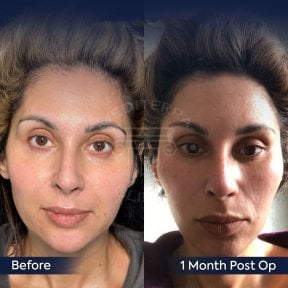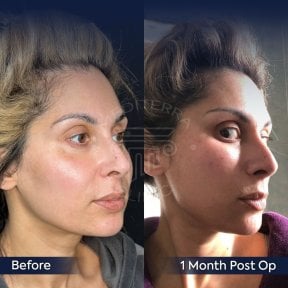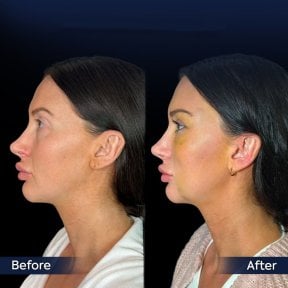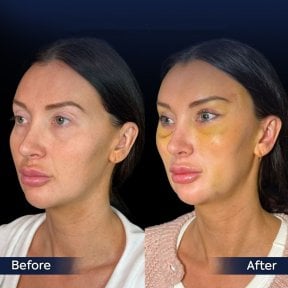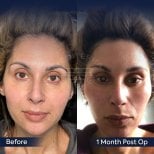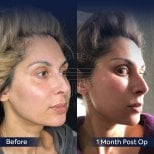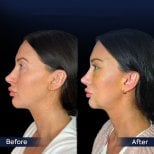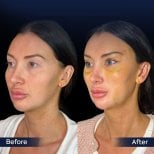VASER liposuction techniques are used for precise fat harvest and facial transfer, enhancing rejuvenation results. The final treatment plan is customized during the in-person consultation at the ISAPS-certified Quartz Hospital. Op. Dr. yunus Cinar performs the procedure. The package costs around $1,850 and covers VIP airport transfers, a 4-star hotel for 6 nights, and one hospital stay.
How it works
How Much Does Facial Fat Transfer Cost in Turkey?
The cost of facial fat transfer in Turkey typically ranges from $2,000 to $2,900. Pricing depends on the clinic, the surgeon’s expertise, how many facial areas are treated, and if additional procedures are combined. In the United States, the average cost is $12,000 (per ASPS). Facial fat transfer in Turkey is typically about 79% less than in the U.S.
In Turkey, most packages include pre-op consultation, local or general anesthesia, fat harvesting and purification, the injection procedure, and post-op follow-up. U.S. prices often only cover the surgeon’s fee, with separate charges for anesthesia, facility, and aftercare. Always confirm exactly what’s included in each clinic’s offer.
Key Benefits
- Save up to 60-70% on facial fat transfer in Turkey compared to the USA and UK.
- Options include NanoFat, Microfat, and Stem Cell Enhanced Fat Transfer.
- Free photo consultation with an expert to determine the optimal facial rejuvenation method.
- 100% data protection and confidentiality guarantee.
- Access exclusive offers from renowned Turkish clinics from $2,135.
| Turkey | The UK | The USA | |
| Facial Fat Transfer | from $2,900 | from $5,500 | from $9,000 |
Medically reviewed by
Fahad MawloodFacial Fat Transfer Packages in Turkey — February 2026
European Board Certified Dr. Ali Sadioglu performs a Deep Plane facelift with endoscopic precision for natural-looking, non-over-tightened results at his practice within Dr. Safa Manav Clinic. The package costs around $9,850 and includes surgery at Harvard-affiliated Avrasya Hospital, a two-night stay with a private nurse, and nine nights at Antwell Hotel with 24/7 infirmary support and daily nurse follow-up. All pre-op tests, anesthesia, medications, and a face compression garment are covered in this comprehensive all-inclusive offer.
Discover the Best Facial Fat Transfer Clinics in Turkey: 75 Verified Options and Prices
Istanbul Aesthetic Plastic Surgery Center
Gürhan Özcan
Hisar Hospital Intercontinental
Hasan Sahin
Memorial Bahçelievler Hospital
Can Ilker Demir
Facial Fat Transfer in Turkey: Your Travel Plan
Day 1: Arrival in Turkey
- Upon landing in Turkey, you will be picked up from the airport by the clinic's transportation service and taken to your hotel. You should aim to arrive on morning flights to have ample time for the day's activities.
- Check into your hotel and rest after your journey. Ensure you have your passport, medical records, and any necessary documentation ready for the clinic visit the next day.
- Avoid taking any medications or supplements that were advised against in the preoperative instructions, such as blood thinners or multivitamins.
- Contact the clinic to confirm your appointment for the next day's consultation and blood tests.
Day 2: Preoperative Consultation and Preparation
- Attend a consultation at the clinic with your plastic surgeon. You will receive a comprehensive evaluation of your facial anatomy and discuss your expectations.
- Undergo necessary preoperative tests such as blood tests and possibly a chest X-ray if required.
- Consult with the anesthesiologist to discuss anesthesia options and any health concerns.
- Review and sign consent forms for the facial fat transfer procedure.
- Ensure you have stopped eating and drinking at least 8 hours before the surgery, as advised.
- Return to your hotel to rest and mentally prepare for the procedure the next day.
Day 3: Surgery Day
- Arrive at the clinic for your scheduled facial fat transfer surgery. The procedure will be performed under general anesthesia.
- The surgery involves harvesting fat from another part of your body and injecting it into targeted facial areas to restore volume and enhance contours.
- Post-surgery, you will be monitored in a private room at the hospital. Expect some swelling and bruising, which is normal.
- Receive post-operative instructions from the medical team, including medication management and care for the surgical site.
- Stay overnight at the hospital for observation and initial recovery.
Day 4: Postoperative Care and Hospital Discharge
- Undergo a postoperative examination by your surgeon to assess your initial recovery and address any concerns.
- Receive detailed instructions on managing swelling, pain, and incision care at home.
- Be discharged from the hospital and return to your hotel. Arrange for a follow-up appointment with the clinic before your departure.
- Continue to rest and avoid any strenuous activities. Maintain a comfortable sleeping position to minimize swelling.
Day 5: Recovery and Light Activity
- Spend the day resting at your hotel. Light walking is encouraged to promote circulation, but avoid any strenuous activities.
- Follow the dietary and lifestyle recommendations provided by your surgeon, such as avoiding alcohol and smoking.
- Gently clean the surgical area as instructed and apply any prescribed ointments or creams to aid healing.
Day 6: Follow-up Appointment and Sightseeing
- Attend a follow-up appointment at the clinic for a check-up and to ensure proper healing.
- Discuss any concerns or questions with your surgeon and receive further guidance on your recovery process.
- If you feel up to it, you may explore some local attractions in a leisurely manner. Be mindful of your energy levels and avoid overexertion.
Day 7: Final Check-up and Departure
- Undergo a final examination by your surgeon to confirm that you are fit to travel and continue recovery at home.
- Receive final instructions for long-term care and discuss any follow-up appointments or remote consultations.
- Pack your belongings and prepare for your journey home. Ensure you have all necessary documents and medications for travel.
- Be picked up by the clinic's transportation service and taken to the airport for your flight home.
Bookimed, a leading global medical tourism platform, is committed to helping clients looking for Facial Fat Transfer in Turkey by offering expert assistance and trustworthy medical solutions for every situation. Smart automatic ranking system is used to compose transparent clinic listings, meticulously maintained by a data scientist using AI for accuracy. The platform guarantees authenticity by publishing reviews from real patients after their treatments. Bookimed offers comprehensive medical solutions, with updates from clinics to ensure trustworthiness. The content about Facial Fat Transfer in Turkey, crafted by experienced medical authors and reviewed by specialists, adheres to Bookimed"s Editorial Guidelines, reflecting the platform"s commitment to delivering high-quality and clear health information. For more details or inquiries, feel free to contact us at marketing@bookimed.com or learn more about us and our mission here.
Our Trusted Doctors
View all DoctorsMurat Yaman
Dr. Yaman performs 500-600 procedures annually, specializing in natural-looking facial and body contouring results at Lokman Hekim Istanbul Hospital.
- Over 15 years of experience in plastic and reconstructive surgery
- Trained in basic microsurgery at Hacettepe University
- Member of Turkish Society of Reconstructive, Aesthetic, and Plastic Surgery
- Specializes in wrinkle reduction and face lifting procedures
Muhammet Mustafa Aydinol
Dr. Muhammet Mustafa Aydinol specializes in aesthetic and reconstructive procedures, including facial fat transfer, with a strong academic and professional background.
- Member of the International Society of Aesthetic Plastic Surgery
- Published research on combining fat injection with implants for breast augmentation
- Trained at Dicle University in Plastic, Reconstructive and Aesthetic Surgery
- Experienced in perforator-based propeller flaps for reconstruction
Aysel Pasazade
Dr. Aysel Pasazade is a plastic, reconstructive, and aesthetic surgeon. She graduated from Istanbul University Cerrahpaşa Faculty of Medicine. She completed her specialization at Bursa Uludağ University Faculty of Medicine. She holds the European Board of Plastic, Reconstructive and Aesthetic Surgery (EBOPRAS) certification.
She has worked in university hospitals and private clinics. She attends international congresses, live surgery courses, and advanced training. This keeps her practice current. She provides careful, personalized care with a focus on patient safety, function, and natural-looking results.
Ali Sadioglu Md
Ranked 59th out of 10,000 doctors in Turkey's Medical Specialization Examination – Dr. Sadioglu specializes in facial fat transfer at Dr. Safa Manav Clinic.
- Trained at Gazi University – a top plastic surgery institution in Turkey
- Certified in microsurgery techniques for precise fat grafting
- Published research on long-term effects of cosmetic treatments
- Teaches residents as part of his clinical practice
Video Stories from Bookimed Patients
Reviews about Bookimed: Discover Patients' Insights
All reviewsFacial Fat Transfer: Before & after photos
View allShare this content
FAQ about Facial Fat Transfer in Turkey
Is Turkey a good place for Facial Fat Transfer procedure?
According to Bookimed, here are the top 10 hospitals in the world:
- Sheba Medical Center (Israel)
- Asklepios Klinik Barmbek (Germany)
- Medipol Mega University Hospital (Turkey)
- Seoul National University Hospital (South Korea)
- Anadolu Medical Center (Turkey)
- Johns Hopkins Hospital (USA)
- Assuta Medical Center (Israel)
- Charité - Universitätsmedizin Berlin (Germany)
- Gleneagles Hospital (Singapore)
- Wiener Privatklinik (Austria)
These hospitals have been selected based on reviews and data from Bookimed, a platform that helps patients to find the best medical solutions. The ranking takes into account the quality of medical services, the level of patient care, the availability of advanced technologies, and the expertise of the medical staff.
How long does it take to get Facial Fat Transfer in Turkey?
Which hospital is best for Facial Fat Transfer in Turkey?
Who is the best Facial Fat Transfer doctors in Turkey?
Bookimed has identified the top doctors in Turkey who excel in performing Facial Fat Transfer:
- Ali Nurhan Özbaba, Aesthetic Medicine and Cosmetology, Plastic Surgery, 34 years experience, with 5.0 reviews score
- Taha Sonmez, Aesthetic Medicine and Cosmetology, Plastic Surgery, 16 years experience, with 4.5 reviews score
- Hasan Sahin, Aesthetic Medicine and Cosmetology, Plastic Surgery, 17 years experience
- Mustafa Erol Demirseren, Aesthetic Medicine and Cosmetology, Plastic Surgery, 29 years experience
- Burak Pasinlioglu, Aesthetic Medicine and Cosmetology, Plastic Surgery, 10 years experience
What are the possible emotional impacts or psychological effects after undergoing a fat restoration for facial contours?
Patients may experience increased self-esteem and satisfaction with their appearance post-procedure. However, it's important to have realistic expectations and consider psychological counseling if needed to address any emotional adjustments.
How does the cost of fat grafting for the face in Turkish clinics compare to other countries, excluding the actual procedure cost?
The overall cost is often lower in Turkey due to affordable accommodation, transportation, and living expenses. Packages frequently include hotel stays, airport transfers, and post-operative care services, offering significant savings compared to Western countries.
What should I know about travel insurance coverage for medical procedures abroad?
Travel insurance policies vary, so it's crucial to confirm whether your plan covers medical tourism procedures. Ensure it includes coverage for potential complications or additional medical care needed while abroad.
How can I verify the reputation and accreditation of the clinic where the procedure will be performed?
Check if the clinic is accredited by international bodies such as JCI. Reading online reviews from previous patients can also provide insights into their experiences and satisfaction levels.
What are the non-surgical alternatives to Facial Fat Transfer, and how do they compare?
Non-surgical alternatives include dermal fillers like hyaluronic acid-based products that offer temporary volume enhancement. While less invasive with minimal downtime, these alternatives require regular maintenance compared to the longer-lasting results of fat transfer.
How do I handle any complications that might arise once I am back in my home country?
If complications occur after returning home, contact your Turkish surgeon immediately for guidance. They may recommend seeing a local healthcare provider if necessary, ensuring continuous care until the issue is resolved.
What should I expect in terms of post-operative care while staying in the country?
Post-operative care typically includes monitoring at the clinic, prescribed medications for pain management, and instructions on how to care for the treated areas. Some packages may also include a compression garment and follow-up visits to ensure proper healing.
Are there any follow-up care options available once I return home after the procedure?
Many clinics offer virtual follow-up consultations via video calls to monitor your healing process once you return home. It's essential to maintain communication with your surgeon for any concerns or questions during recovery.
What is the expected recovery time after the fat restoration for facial contours, and how will it affect my travel plans?
The initial recovery period for Facial Fat Transfer is about 1 to 2 weeks, during which swelling and bruising gradually subside. Patients are generally advised to stay in Turkey for at least a week post-procedure for follow-up care before traveling back home.
Will there be a language barrier during my consultations and procedure in a Turkish clinic?
Most clinics in Turkey cater to international patients and provide English-speaking staff or translators to facilitate communication during consultations and procedures. It's advisable to confirm language support services when booking your appointment.
How do I ensure the qualifications and experience of the surgeon performing my procedure?
Verify the surgeon's credentials by checking if they are members of reputable organizations like ISAPS or the Turkish Society of Plastic Reconstructive and Aesthetic Surgeons. Additionally, review their portfolio of previous work and patient testimonials for assurance.
What are the potential risks and complications of having a lipofilling of the face abroad?
Facial Fat Transfer carries risks such as infection, asymmetry, fat embolism, and absorption of the transferred fat. However, choosing a board-certified surgeon can minimize these risks. Clinics in Turkey often follow international safety standards to ensure patient safety.
What is the level of medicine in Turkey?
Healthcare is the key development sector of the Turkish government. The Turkish authorities are convinced that care for the citizens' health should be an absolute priority of state policy and spend about 77 billion liras for healthcare annually.
As a result, 28,000 medical facilities provide excellent medical care in the country. About 50 centers have certificate of JCI (Joint Commission International), the international improver of healthcare quality and safety across the globe. The index of certificates obtained is the largest. To compare, Israel has 20 JCI-accredited facilities, and Germany — only 10 clinics of this type.
What should you know about Turkey before the trip?
| Currency | lira (you also can pay for services in dollars and euros) |
| Best period for the trip | May-October |
| Language | Turkish (most of medical staff speaks English fluently) |
| Visa | is not required for a trip of at least 30 days per visit |
| Time difference with Europe | 3 hours |
| Time difference with the USA | 8 hours |
| Capital | Ankara |
| Medical tourism center | Istanbul |
| Popular resorts | Alanya, Antalya, Kemer, Marmaris |
What hotel services are provided here?
In Turkey, hotels of different price ranges and service levels are presented. The level of Turkish hotels is comparable to hotels in Tunisia, Morocco or Egypt. Most tourists choose 4 and 5 star hotels with all-inclusive meals. Such hotels have everything for a comfortable stay: varied food, a large well-groomed territory, animation for children and adults. Some hotels have their own water park, which guests can use for free. Budget travelers can afford to book an economical 3-star hotel with half board or no meals at all.
When is the best time to travel to Turkey?
The main advantage of Turkish resorts is the long beach season. On the Mediterranean coast, it starts in April and lasts until November. In the resorts of the Aegean Sea — from May to October. The most comfortable time for swimming is from mid-June to the end of October. A large influx of tourists is in July-August, when the air temperature is +38°C, and the water warms up to +27°C.
Do I need a visa?
In 2020, the Republic of Turkey has visa-free agreements with 89 states. Some foreigners are exempted from obtaining entry visas, others are required to receive an electronic visa (e-Visa), and still others must apply for a visa at Turkish missions abroad.
What states need a visa for treatment in Turkey and what countries can cross the border free and easy read here.
What documents are required to apply for a visa to Turkey for treatment?
Visas for travel to Turkey require a number of documents. The necessary papers can be submitted 90 days before the planned departure. Lists of documents includes:
- ID card
- confirmation of online registration and filling out the questionnaire
- certificate of income and availability of funds ($50 per day per person)
- insurance policy for a stay in Turkey (original and copy)
- 2 photos (5x6)
- visa receipt
- booking of flight and hotel
- medical opinion about the need for treatment.
